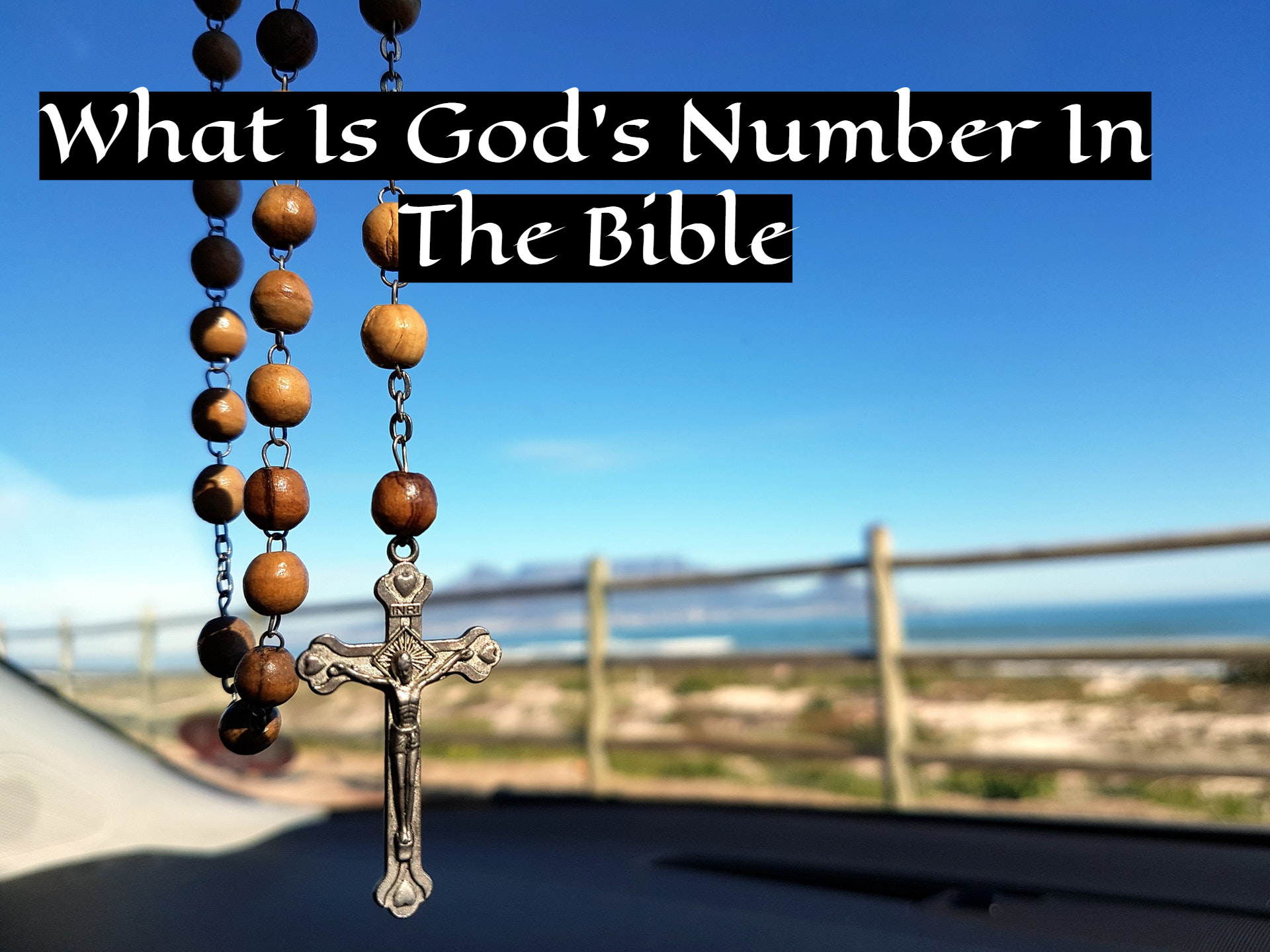What Is God's Number In The Bible - God's Favorite Number
The number seven is frequently mentioned in the Bible about ideas like completeness, vindication, and the keeping of promises, which shows that God considers the number to be sacred.
Author:Suleman ShahReviewer:Han JuNov 07, 20221 Shares165 Views

What is God's number in the Biblesuch as the number of rivers that sprung from Eden, the size of Solomon's temple in cubits, the number of people who will be "sealed" at the Second Coming (144,000), and many others?
But how should we interpret all of those figures? Do we accept things at face value or do we give them mystical meaning?
The idea that numbers themselves have significance beyond counting and calculation was originally advanced by the Greek philosopher Pythagoras, who lived in the sixth century B.C.E.
Numbers have mystical meanings that are connected to the divine. According to John Davis, author of "Biblical Numerology:
A Basic Study of the Use of Numbers in the Bible," both Jewish and later Christian readers of the Bible sought to glean mystical meanings from numbers using a variety of inventive approaches. They did this to emulate Pythagoras.
For instance, words and letters both have numerical values in the Hebrew and Greek languages.
Numbers were spelled out using letters because there were no Arabic numerals back then (1, 2, 3, etc.).
In Greek, alpha equals 1, beta equals 2, and so on. This implies that each word found in the New Testament's original Greek may be converted into a number. Alternatively, you may make any number into a word.
The technique of giving symbolic significance to words based on their numerical meanings is known as gematria in Hebrew and was embraced by Jewish mystics and kabbalists.
It is known as isopsephy in Greek, and Christian gnostics who were looking for deeper significance in the New Testament frequently used this method.
These tactics are still used today as "biblical numerology," the fad that holds that God reveals secret meanings in the Bible's numbers.
There are innumerable websites and publications devoted to using inventive math on Bible texts to unlock heavenly mysteries.
Numerology is quickly dismissed as a silly fad by serious Bible scholars, not as a reliable method of understanding the Bible or spiritual truths.
The author of the aforementioned book on biblical numerology, Davis, who is a devout Christian, concluded that "the whole system must be dismissed as a viable method of exegesis" and that "such interpretations are artificial and arbitrary and have no place in Christian theology."
Nevertheless, some biblical numbers are difficult to ignore, particularly those that recur often (7, 12, 40) and those that have been associated with millennia of symbolism (666!).
Let's investigate the meaning and symbolism of some of the most well-known biblical numerals.
Seven Is God's Favorite Number
Unbelievable, but true. God loves the number seven. The evidence The Holy Book The number seven appears frequently in the Bible (from Genesis to Revelation).
The number seven appears 735 times in the Bible. There are 54 references to seven in the Book of Revelation.
Seven times the phrase "seven-fold" is used, compared to 98 times the word "seventh." 56 times total, the term "seventy" is also used.
The term "created" is also used seven times in the Book of Genesis, which begins with the account of creation, to emphasize God's creative efforts.
God created everything in the beginning over six (6) days. On the seventh day, he took a break.
We learn that God invented the idea of seven days a week in the Book of Genesis. I'll list a few places in the Bible where the number seven is mentioned:
In the final book of the Holy Bible, the Book of Revelation, there are references to seven churches; seven angels; seven spirits; seven stars; seven seals; seven trumpets; seven thunders; and seven last plagues.
- In the Book of Genesis, it is stated that God rested on the seventh day, Noah entered the ark with seven other people, and the floods came seven days later.
- In Joshua 6:1-16, God told the Israelites to march around Jericho seven times before the walls fell on the seventh day.
- In Matthew 18:21-22, Jesus advised forgiveness seventy times seven.
- Before the walls of Jericho fell, we can also observe from the biblical story seven priests blowing seven trumpets made of ram's horns.
The seven feast days of the Lord are mentioned in Chapter 23:1-44 of the Book of Leviticus (Passover, Unleavened, First-fruits, Pentecost, Atonement, Trumpets, and Tabernacle).
We learn that Mary Magdalene, who had previously been afflicted by Satan, had seven demons thrown out of her in the Book of Luke 8:2.
According to Matthew 12:45, "seven additional spirits" that were far eviler than men entered his body. Additionally, it is reported in Matthew 13 that Jesus spoke seven parables to his audience.
Samson confessed to Delilah that his power was in his hair in Judges 16:13. "Seven locks" of his hair are mentioned. Leviticus 25:4 states that "the seventh year shall be a Sabbath of rest."
The number seven and multiples of seven are frequently mentioned in the Bible. Amazingly, Jesus miraculously healed seven people on a Sabbath day, according to Chapter 5 of the Book of Matthew.
King Solomon also needed seven years to complete the temple. Can you recall the famine that existed in Egypt during Joseph's reign?
Seven years of cultivation were followed by seven years of famine. Many Bible experts are baffled by the prevalence of the number seven and multiples of seven in the Bible.
This is a Biblical mathematical anomaly that has persisted to this day in obscurity. I, like most Bible-believing Christians, think that God is just affirming his perfection as God.
Did you know that the Bible continues the pattern of sevens? Few of us are aware that the number seven comes to lifewithin the human body.
Seven bones make up our neck, seven bones make up our face, seven bones make up our ankles, and seven holes make up our head.
We can all benefit from reading the Holy Bible more often and learning things that modern scienceand technologycannot explain.
What Does The Significance Of Number 7?
The number seven is frequently mentioned in the Bible about ideas like completeness, vindication, and the keeping of promises, which shows that God considers the number to be sacred.
This conclusion must be balanced against the reality that not all references to the number seven in the Bible have a religious connotation.
In that sense, even while it is legitimate to draw conclusions from studying Scripture, we must keep in mind that the Lord's methods and ideas are higher than ours, just as the skies are higher than the earth (Isaiah 55:9).
When we examine the Bible, we might discover a variety of numbers that run through the texts with deeper implications.
These demonstrate God's masterful design and the marvelous ways in which it plays out across history.
Significance Of Number 7 In Exoneration And Healing
The keeping of vows or commitments is another event that usually involves the number seven.
The Hebrew words for seven (Sheba) and making an oath (Shaba) both come from the same root that also means contentment or fullness (saba).
God commits Genesis not to flood the Earth again, and the rainbow, which has seven colors, serves as a reminder of this pledge (Genesis 9:8-15).
According to a later chapter of Genesis (Genesis 21:22–31), Abraham swore an ownership covenant over particular water well.
The location of the oath was given the name "Beersheba," which might mean either "well of the oath" or "well of seven," since Abraham fulfilled it with a gift of seven sheep.
In the Book of Joshua, we have another illustration of the relationship between seven and promises.
There, God told Joshua that if Joshua and his army marched around the city once every six days and seven times on the seventh day with seven priests blowing seven trumpets, he would tear down the strong walls of Jericho.
Joshua obeyed the Lord's instructions precisely, and as He had foretold, the walls of Jericho fell (Joshua 6:1-20).
The number seven is linked to promises in the Book of Revelation. We read specifically about seven letters sent to seven congregations (Revelation 2-3).
Christ promises each church community in the letters that each community will get its promised reward if its people turn from their sins and live as Jesus commands.
Also, while discussing God's promise to save those whose names are inscribed in the Book of Life and to damn those whose names are not, Revelation frequently refers to the number seven (Revelation 20:15; 21:1, 27).
Seven groupings of things, including seven seals, seven trumpets blown by seven angels, and seven bowls of God's promised wrath borne by seven angels, herald the arrival of this heavenly promise's fulfillment (Revelation 6, 8, 11, 16).
Are 3 And 26 God’s Number?
One of the most significant numbers in the Bible is 3, which represents harmony, God's presence, and completion.
Given that Christ was raised from the dead after three days, the number three represents eternal life.
Peter, John, and James were the three individuals who witnessed the Holy Transfiguration of Jesus.
the religious. The gematric number is 26, which is the total of the Hebrew letters that make up the name of the Israelite deity YHWH (Hebrew: ).
Top 8 Significant Numbers In Bible
Analyzing God's Word critically is a crucial part of developing a relationship with Him. To do this, one method is to comprehend and analyze how he uses biblical numbers.
The Bible has links and patterns that help us understand its deeper significance. The patterns are unique to God's creation and did not happen by accident.
Each is associated with a certain symbol. The Bible's holy codes and important numerals are listed here.
Number 1
The Bible makes frequent use of the number one. Most significantly, it describes God as the "one true God," with only one of him.
This is reiterated in both the first commandment, which states, "Thou shalt have no other gods save Me," and Deuteronomy 6:4, which declares, "Hear, O Israel: the Lord our God, the Lord is one."
God and humanity are one. God is not two different things but is constantly with us and in our hearts.
Whenever a person seems in the Bible to be by themselves in the wilderness whether it be Moses, Elijah, or Jesus they are never truly by themselves. They may never be closer to the one true God than they are right now.
Number 2
In the Bible, the number two represents oneness. For instance, in Genesis 1:27, the man and the woman were united as one flesh.
In the Old Testament, animals were always sacrificed in pairs, and the disciples and apostles were also dispatched in pairs (Matthew 6:7).
This is God's method of expressing the idea that two individuals may come together and form a relationship.
Number 22
In the Bible, the number 22 is treated in a much more mathematical manner. The circle is seen to be the ideal form since it has no corners.
A close approximation to pi, or the ratio of a circle's circumference to its diameter, is twenty-two divided by seven.
The Bible has 22 books, from the first epistle to its conclusion, which can be related to the so-called Canon Wheel.
There are three portions to the Bible, each with 22 books. Genesis through the Song of Solomon makes up the first section, Isaiah through Acts makes up the second, and Romans through Revelation make up the third.
Consider the first as standing in for the Father, the second for the Son, and the third for the Spirit.
The Hebrew alphabet is made up of 22 letters. The 22nd chapter of Revelation brings the Bible to a close.
Abraham was born in the year 2167 BC if the ages of the patriarchs as recorded in the Bible are tallied together.
The exact number of years from that point to the year of Jesus' death, 33 AD, is 2200. While in pain on the cross, Jesus cries out, "My God, my God, why hast thou abandoned me?" This is the first line of Psalm 22.
There are 22 names in the list of males from Adam to Jacob. For 22 years, Jeroboam ruled.
Number 12
Twelve represents the foundation and end. The Tree of Life bears fruit in 12 different varieties, and there were 12 apostles and 12 tribes of Israel.
Jerusalem has many characteristics that add up to number 12: In the basement, there are 12 gates and 12 valuable stones.
With 12 chapters, Daniel is similarly concerned with the approaching end of the world.
Blessed is the one who waits and comes to the conclusion of the 1,335 days, according to Daniel 12:12. 12 is equivalent to 1 plus 3 plus 3 plus 5.
Number 40
In the Bible, the number 40 represents completeness. This number appears 146 times in the Bible.
The number 40 is associated with trials and tests of all kinds in Hebrew culture. After 400 years of servitude, the Israelites were forced to wander for another 40 years across Sinai.
God's Law was given to Moses on Mount Sinai for 40 days. Elijah later worshiped God for 40 days on the same mountain.
The phrase "40 days and 40 nights" appears several times in the Bible. The 40 days and nights of rain that resulted in the Noahic Flood are the most significant.
Before succumbing to the devil's temptation, Jesus fasted for 40 days in the desert. After his resurrection, Jesus stayed on Earth for 40 days, appearing to the Apostles and instructing them before ascending to Heaven.
Number 4
Four denotes integrity and completion. Jesus' ancestry may be traced back to Judah, the fourth of Israel's 12 tribes.
The four main prophets who wrote books are Isaiah, Jeremiah, Ezekiel, and Daniel. There are four apocalyptic horsemen.
At each of the four corners of the Earth, four angels are waiting. Four living monsters are mentioned in the four gospels: Daniel, Ezekiel, and Revelation.
Since the standard cross of the period was either a single, vertical pole, known as a crux simplex or a Tau cross, named after the capital Greek T, the presence of four points on the cross is more significant than you may realize.
Unless something else needed to be placed above the head of the condemned, the lowercase "t" was superfluous. Such placards were only required for the executions of famous people.
Numbers 6 And 7
While seven is regarded as the perfect number, the Bible employs the number six to denote imperfection.
Six days make up the work week, but something is still lacking until God decides to provide the seventh day of rest. The Bible's most well-known number is 666, which represents Satan.
However, the Holy Trinity is 777 since it is thought to be a perfect trinity. In the book of Revelation, God is believed to have seven spirits, each symbolized by a lamp stand. Seven words make up the first sentence in the Old Testament.
Numerous numerals may be found throughout the Bible, and each one has a unique connotation.
God purposefully included these numbers in the Bible, and by studying them, we can better understand His words.
People Also Ask
What Is The Number Of God?
Number seven is the God number because the figure alludes to the victory of God's number 7 over the Devil's number 666.
Why Is 7 The Number Of God?
Seven is the number of God because the Hebrew word for completion or fullness shares the same consonants as the number "seven."
What Number Is The Symbol Of God?
It should come as no surprise that unity is often represented by the number 1. As a result, it frequently represents God or the cosmos in monotheistic religions.
Conclusion
The Bible's frequent usage of the number seven to represent completeness, exoneration, and promise fulfillment implies God reveres it.
However, not every occurrence of seven in Scripture has a heavenly meaning.
While it's legitimate to draw implications from Scripture, we must remember that just as the skies are higher than the earth, so are the Lord's methods and ideas higher than ours (Isaiah 55:9).
When we investigate the Bible, we may uncover many numbers with deeper implications. These illustrate God's plan in action throughout history.

Suleman Shah
Author
Suleman Shah is a researcher and freelance writer. As a researcher, he has worked with MNS University of Agriculture, Multan (Pakistan) and Texas A & M University (USA). He regularly writes science articles and blogs for science news website immersse.com and open access publishers OA Publishing London and Scientific Times. He loves to keep himself updated on scientific developments and convert these developments into everyday language to update the readers about the developments in the scientific era. His primary research focus is Plant sciences, and he contributed to this field by publishing his research in scientific journals and presenting his work at many Conferences.
Shah graduated from the University of Agriculture Faisalabad (Pakistan) and started his professional carrier with Jaffer Agro Services and later with the Agriculture Department of the Government of Pakistan. His research interest compelled and attracted him to proceed with his carrier in Plant sciences research. So, he started his Ph.D. in Soil Science at MNS University of Agriculture Multan (Pakistan). Later, he started working as a visiting scholar with Texas A&M University (USA).
Shah’s experience with big Open Excess publishers like Springers, Frontiers, MDPI, etc., testified to his belief in Open Access as a barrier-removing mechanism between researchers and the readers of their research. Shah believes that Open Access is revolutionizing the publication process and benefitting research in all fields.

Han Ju
Reviewer
Hello! I'm Han Ju, the heart behind World Wide Journals. My life is a unique tapestry woven from the threads of news, spirituality, and science, enriched by melodies from my guitar. Raised amidst tales of the ancient and the arcane, I developed a keen eye for the stories that truly matter. Through my work, I seek to bridge the seen with the unseen, marrying the rigor of science with the depth of spirituality.
Each article at World Wide Journals is a piece of this ongoing quest, blending analysis with personal reflection. Whether exploring quantum frontiers or strumming chords under the stars, my aim is to inspire and provoke thought, inviting you into a world where every discovery is a note in the grand symphony of existence.
Welcome aboard this journey of insight and exploration, where curiosity leads and music guides.
Latest Articles
Popular Articles


